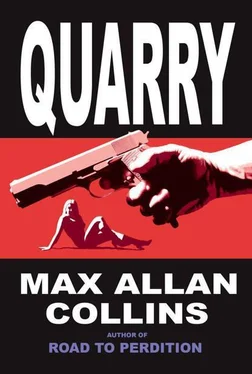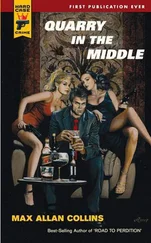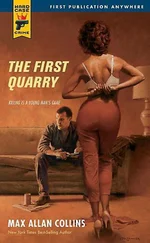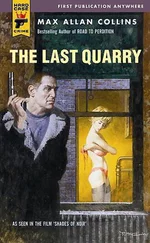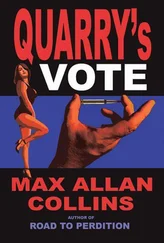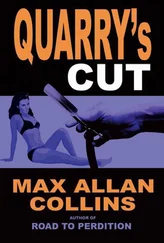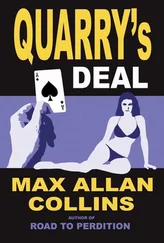Max Collins - Quarry
Здесь есть возможность читать онлайн «Max Collins - Quarry» весь текст электронной книги совершенно бесплатно (целиком полную версию без сокращений). В некоторых случаях можно слушать аудио, скачать через торрент в формате fb2 и присутствует краткое содержание. Жанр: Криминальный детектив, на английском языке. Описание произведения, (предисловие) а так же отзывы посетителей доступны на портале библиотеки ЛибКат.
- Название:Quarry
- Автор:
- Жанр:
- Год:неизвестен
- ISBN:нет данных
- Рейтинг книги:4 / 5. Голосов: 1
-
Избранное:Добавить в избранное
- Отзывы:
-
Ваша оценка:
- 80
- 1
- 2
- 3
- 4
- 5
Quarry: краткое содержание, описание и аннотация
Предлагаем к чтению аннотацию, описание, краткое содержание или предисловие (зависит от того, что написал сам автор книги «Quarry»). Если вы не нашли необходимую информацию о книге — напишите в комментариях, мы постараемся отыскать её.
Quarry — читать онлайн бесплатно полную книгу (весь текст) целиком
Ниже представлен текст книги, разбитый по страницам. Система сохранения места последней прочитанной страницы, позволяет с удобством читать онлайн бесплатно книгу «Quarry», без необходимости каждый раз заново искать на чём Вы остановились. Поставьте закладку, и сможете в любой момент перейти на страницу, на которой закончили чтение.
Интервал:
Закладка:
“They make a lot of money with the radio show?”
“Piles, and more off the products. They got a line of foodstuffs, called likewise Kitchen Korner. Jam and soup, mostly, some other things.”
“All of it made in Port City?”
“They make the jam here. The soup, too. They sell all other sorts of business that’s made elsewhere, farmed out to manufacturers who ship the stuff here, where it gets a Kitchen Korner label pasted on. Old Martha’s on the label, smiling from eternity. The old gal’s immortal, if you call sitting cold as can be in a thousand refrigerators immortal.”
“Why wasn’t this Albert in on the money?”
“Wellsir, Albert was a funny one. Always kind of quiet-spoken. Stayed to himself as a kid. One of my sons went to school with him and said the other kids used to pick on Albert and make fun of him, ’cause he was something of an odd-looking duck.” Again, he shook his head. “And kids can be cruel. Real cruel. Near as cruel as adults.”
“Yes.”
“Anyway, he was pretty good in the brains department, Albert was. High I.Q. and all. High school salutatorian. But when he went off to college, well, he had problems… some folks said it was a girl he got stuck on who played him foolish… others say he couldn’t get along without his momma at his side, he always was sort of sheltered by old Martha. However the reason, he come back from his mental treatment even stranger than before, different…” He whispered this, as though Albert might be listening in. “… sort of a vegetable, don’t you know. Not bright like before, nosir. Mumbling, stuttering, shuffling… it was a sad sight, I mean to tell you.”
“Has he been an embarrassment to his family?”
“I hope to shout. But Albert never caused ’em any harm. He went his own way. He’s always been a friendly sort, in his quiet manner, and most people speak kindly of him, if they speak of him at all. Matter of fact, I always thought it was kind of low of that family, the way they didn’t look after Albert.”
“Oh?”
“His momma wasn’t near so partial to him after his breakdown, and his poppa never paid him much mind to begin with. After the mother and father died, Linda Sue… which seems to me kind of a silly name for her, now that she’s a woman of forty-five… Linda Sue told Albert to move out of the house. The Leroy home is one of those mansion-type things up on the West Hill, looking out on the river, don’t you see, one of those real old beauties up there, know the ones mean?”
“Yes.”
“They gave him a janitor job down in South End where they make the soup, but that’s all they done for him, far as I know. Some folks think Albert had money left to him, others think his janitor pay was high, like as if he was an executive, but was storing it away, hoarding, like a hermit. I suppose that’s what led to what happened to him. Somebody took a gun up there and shot him and went searching for buried treasure.” He laughed. “Dollars to doughnuts whoever-it-was didn’t find a thing.”
“You were talking to somebody across the street, a tall man. Who was that?”
“Raymond Springborn. Linda Sue’s husband. His family has money, too, got a lot of land holdings and property round town.” He leaned over, confidentially. “Some folks don’t know it, but I hear he’s part owner of that nightclub place, the one run by that girl who did that nudie thing in that Bunny book. Ah, that’s the name of the place, Bunny’s. He’s in it with that gal, and isn’t that pretty company for the hometown Kitchen Korner boy.” He cleared his throat. “Not to be disrespectful. I’m sure he isn’t having anything but business dealings with that gal. Mr. Springborn’s okay. Got a hell of a fine business head.”
“Sounds like you know him pretty well.”
“I sure do. He’s my landlord, don’t you know. Why you’re sitting in one of his buildings right now. If you look out front you’ll see it carved in the stone: Springborn Apartments.”
20
Cyprus was in the valley between East and West Hill and was a street which seemed to slash the town in half. Located on Cyprus was the local newspaper’s office, the county hospital, a public high school, a Catholic grade school, half a dozen churches and, just before the street turned into Highway 22, a drive-in movie playing a couple of skin flicks. I didn’t care about any of that. I was on Cyprus not for a guided tour of Port City, but because I was looking for Fuller Street.
Fuller was an offshoot of Cyprus and ran up the edge of West Hill, just as West Third Street ran up the outer edge of the Hill, on the riverfront side of town. Fuller cut through a respectable middle-class residential area, mostly two-story white clapboards that had seen better days but were far from rundown, while West Third crossed through the section filled with near-mansions that were old but not visibly decaying. Raymond Springborn and his wife Linda Sue lived in one of those near-mansions on West Third. Peg Baker lived in an apartment house just off Cyprus on Fuller, in the dip before the rise of the Hill. Between them was Port City.
The apartment house was two-story red brick trimmed in white, white wrought-iron handrails along the upper floor winding down around a wide cement stairway that came up the center front of the building. The structure had a blandly ageless quality: it could’ve been put up twenty years ago or yesterday. The parking lot was bigger than the ten-apartment complex required, and looked as though it might’ve been installed by a landlord who disliked mowing lawns; there were little squares of grass and shrubbery stuck here and there around the concrete lawn, like sprigs of parsley on a big empty plate.
I pulled the rental Ford into the largely vacant lot, only a third-filled now as it was past nine and folks were off to work, these cars remaining being second cars, or belonging to people who worked nights, like Peg Baker. I snuggled in between a station wagon and a Volks and turned off the engine and got out.
The phone book had listed Peg Baker’s address as 121 Fuller, and this was 121 Fuller, all ten apartments of it. Some of the tenants had their names on their mailboxes, six of the ten did anyway, but not Peg Baker. Knowing six of the places weren’t hers narrowed the field, but not enough. And the curtains on those four remaining apartments were all closed, too, in case I wanted to risk getting busted for window-peeking. I could always check with the manager to see which apartment was Peg Baker’s, but the manager lived elsewhere. On the door of a laundry room was a notice giving the manager’s name and address and hours at which to call. The hours were in the evening, but I used the pay phone in the laundry room anyway and tried the manager’s number and a recorded voice asked me to leave a message after the tone and I hung up. Damn.
I was just getting ready to pick one of the four doors at random and knock when I spotted what had to be Peg Baker’s car. Her registration would probably be visible, and on that would be her address. Hopefully that address would be more specific than “121 Fuller.”
It was no chore figuring the car as hers. The surprise was I hadn’t spotted it immediately, but I hadn’t, because it was hidden down there in the end stall on the opposite side of the lot from where I’d parked. It was crouching there behind a big blue four-year-old Caddy.
It was a pink Mustang.
Several years old, but shiny and pink and dentless like new, a sheltered pink baby that never grew up, a Peter Pan of a car, parked way down on the end where nobody could hurt it. The upholstery was pink. The carpeting was pink. The dashboard was pink. The gearshift knob was pink. I was afraid to look under the hood.
Читать дальшеИнтервал:
Закладка:
Похожие книги на «Quarry»
Представляем Вашему вниманию похожие книги на «Quarry» списком для выбора. Мы отобрали схожую по названию и смыслу литературу в надежде предоставить читателям больше вариантов отыскать новые, интересные, ещё непрочитанные произведения.
Обсуждение, отзывы о книге «Quarry» и просто собственные мнения читателей. Оставьте ваши комментарии, напишите, что Вы думаете о произведении, его смысле или главных героях. Укажите что конкретно понравилось, а что нет, и почему Вы так считаете.
